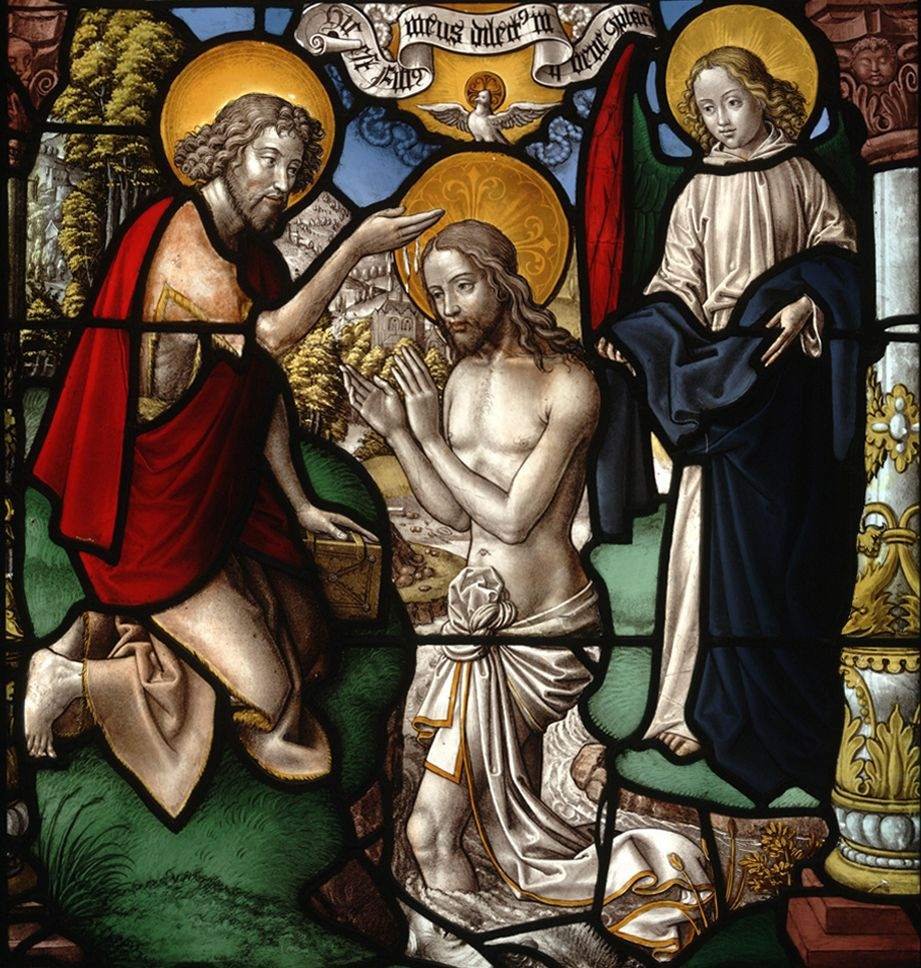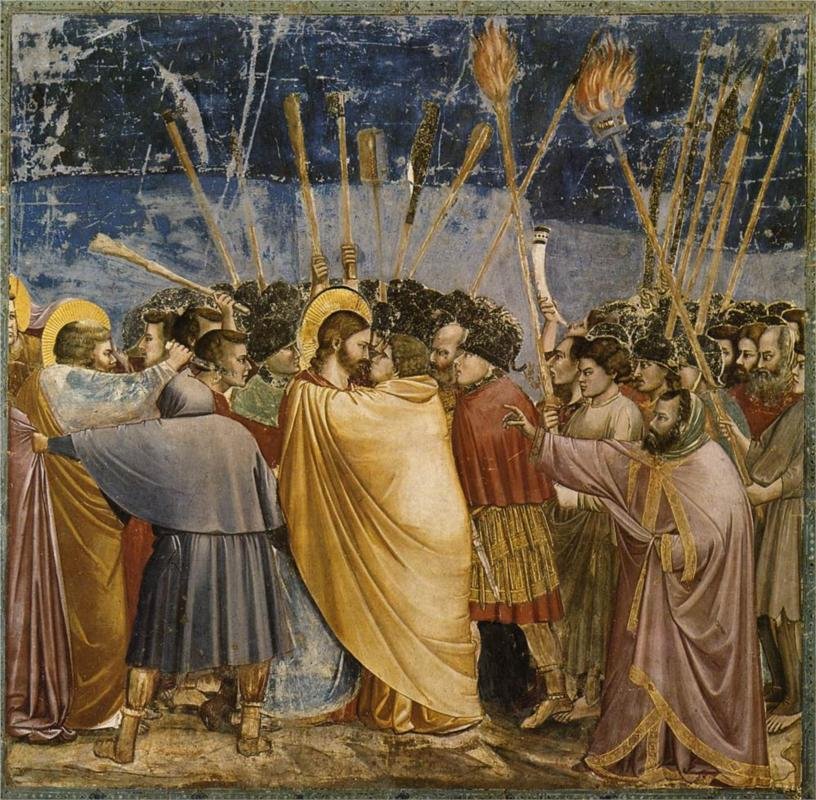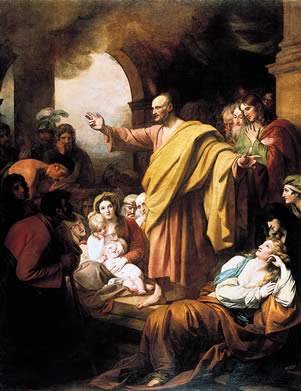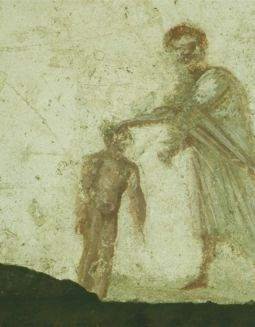Part two of a longer piece on “Falling from Grace.” [Part one.]
Catholics: Salvation is a Journey

The Baptism of Christ, stained glass from Mariawald Abbey, by Gerhard Rhemish, The Master of St. Severin, Germany (Victoria and Albert Museum)
So then, Catholics view salvation not as a single, momentary event, but as a road, a journey, a pilgrimage, a race (Hebrews 12:1). We have not yet arrived at our destination, the heavenly Jerusalem. There is certainly, in the Catholic mind, a sense in which we have been saved: at our Baptism, we are born again in Christ (John 3:3,5). We are buried with Him in death and raised to newness of life in His Resurrection (Romans 6:3–6); the old has passed away, and we are a new creation (2 Corinthians 5:17). Catholics do not often speak of being “saved” in the present tense or of “getting saved” as a momentary event, as especially Evangelical Protestants do — for this we are often criticized. “Catholics don’t believe in being ‘saved’! They say they will not know if they are ‘saved’ until the end of their lives!” That isn’t quite true. We know that we have been saved from our former life and given a new life in Christ; whether we will be saved in the end is something that not even Paul could state with certainty (1 Corinthians 4:3–5).

Giotto, The Arrest of Christ (The Kiss of Judas), c. 1306 (WikiArt.org).
Why could Paul not, and why can’t we, know our final salvation for certain? Paul himself tells us that although he knows of nothing against himself, it will ultimately be God Who judges him, “[when] the Lord comes” — and that he is, in his belief of his own innocence, not thereby acquitted — οὐκ δεδικαίωμαι [ouk dedikaiōmai], from δικαιόω [dikaioō], the same verb that is more commonly translated justified. Protestant apologists readily stress that δικαιόω, “justify,” has a primarily forensic meaning, of acquittal — which it does — but they are quick to gloss over instances such as this that do not fit their interpretation of a “once and for all” event. Paul, then, understands that his present and future sins can still be held against him, even the sins of his heart (v. 5); and he knows the danger of falling away — of which Jesus often warned (e.g. Matthew 24:10; Mark 14:27; Luke 8:13; John 16:1). Frequent, too, are the warnings, even from Paul, against falling into sin (e.g. 1 Corinthians 6:9, 10:12; Galatians 5:21; 1 Timothy 3:6, 6:9–10; Hebrews 10:29; James 5:12; 2 Peter 1:10).
Being “Born Again”: Renegeration and Conversion
Many Protestants, particularly Evangelicals, object to the Catholic identification of Jesus’s call to be “born again” with Baptism — despite the fact that this was historically the universal understanding of the Church in interpreting John 3:3,5, even in Protestant traditions, dating from the earliest times (see especially Justin Martyr, First Apology LX, quoted in this post). The objection that this “new birth” refers to a spiritual rebirth and renewal, not only to a physical washing, reflects a misunderstanding of the concept of sacramentality. A sacrament is an outward and visible manifestation that both represents and actually accomplishes an inward and spiritual grace: so in Baptism, the outward washing and covering with water both represents an inward spiritual cleansing (Ephesians 5:25–27, Hebrews 10:19–22) and a burial and resurrection with Christ (Romans 6:3–10, Colossians 2:11–15), but also actually accomplishes the grace of the washing away of sins (Acts 22:16) and spiritual regeneration (Titus 3:3–5).

St. Peter Preaching at Pentecost, by Benjamin West (1738–1820) (Wikimedia).
But it is indeed a truth that there must be a genuine, inward conversion to Christ, a renewal in faith and turning toward Him, in the believer’s life. Catholics, in affirming the efficacy of Baptism in regeneration, in no way detract from this necessity. Especially in adult believers, regeneration in Baptism generally coincides with a faithful conversion to Christ — but it is not necessarily the same thing. The most strident objections come from Baptists and other opponents of “Paedobaptism” (the Baptism of infants), who argue that infants have no faith and cannot truly convert to Christ, and therefore cannot be regenerated: but it is not our faith alone that justifies us or regenerates us, but the working of God’s grace through the Holy Spirit; and He can work no less ably in the life of a child than in anyone else’s. For children, this regeneration in Baptism must be followed by growth in faith and conversion; and the good faith of the child’s family, his or her parents and the Church, in pledging to raise the child as a Christian, is a surety in this.
We must be born again. This is as true for our rebirth and regeneration in Baptism as it is for our sincere and faithful conversion to Christ. Catholics believe this as surely and certainly as do Evangelicals or any Protestants. We may not always have stories of sudden, life-changing “conversion experiences” — though very many do. Consider St. Augustine, St. Francis, or St. Ignatius of Loyola! For my part, my conversion to Christ has been a lifelong and ongoing journey. I can say that, being raised by godly parents in a godly church, God has always embraced me; and over the years, as I’ve learned and matured, I’ve grown in faith, and never converted to Him so wholeheartedly or passionately as I have as a Catholic.
Next up: An aside on Catholicism and Assurance of Salvation. Then, The Catholic View of Grace and Justification.


Pingback: Justification Is Not the End of the Road | The Lonely Pilgrim
Pingback: Catholicism and Assurance of Salvation | The Lonely Pilgrim
Pingback: Falling from Grace, and God’s Mercy and Forgiveness | The Lonely Pilgrim